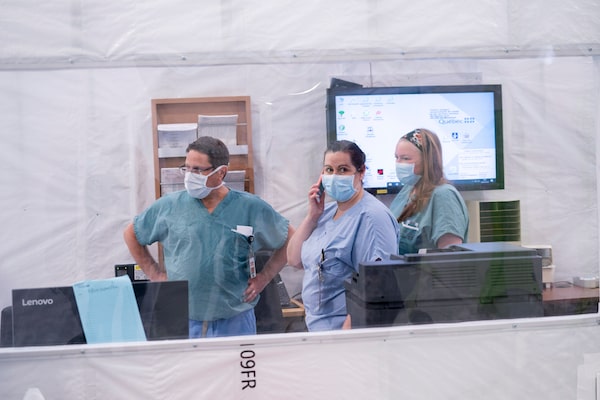
Health care workers at the nursing station in Verdun Hospital in Montreal.Paul Chiasson/The Canadian Press
With the new Omicron variant being highly transmissible but often yielding only mild illness, Ontario and Quebec are both looking at ways to keep health care workers on duty even if they have been exposed to the virus.
These scenarios come as the surging number of new COVID-19 cases, fuelled by the new variant, has raised concerns that hospitals could run out of workers after many were exposed to the virus and had to go into isolation.
“There is a need to get as many people as possible into hospitals,” Quebec Health Minister Christian Dubé told reporters Wednesday, referring to health care staff.
The Ontario government says hospital staffers who have been in close contact with someone with COVID-19 need not stay home from work, so long as they continue to test negative for the virus daily.
Hospital workers who have been in contact with a positive case must take a PCR test as soon as possible, and repeat the test on Day 7, said Alexandra Hilkene, a spokeswoman for Ontario Health Minister Christine Elliott.
They must also take rapid antigen tests daily for 10 days, and can only come into work if they remain asymptomatic and if all tests come back negative.
In Quebec, Mr. Dubé confirmed that his government is considering having workers who test positive stay on the job if they have no symptoms.
“It is something we will consider, but we will manage the risks,” he said, explaining that some precautionary steps would be taken, such as assigning those asymptomatic, COVID-positive workers to hot zones with patients already exposed to the virus.
Provinces restrict travel, gatherings as Omicron variant cases surge
Quebec considers asking hospital workers with COVID-19 to stay on the job
Having infected yet asymptomatic workers remain on duty is tricky, but it is a scenario that needs to be discussed and considered because of the quick spread of the Omicron variant, some health experts say.
“It’s definitely with risks, and everyone acknowledges that … we’re at a stage where we’re trying to think of every possible way to keep going without having to shut down services,” Susy Hota, medical director of infection prevention and control at Toronto’s University Health Network, said in an interview.
“It has to be done with a lot of thought … and additional safety measures to be considered,” Dr. Hota added.
Marjorie Larouche, a spokeswoman for the Quebec Health Department, noted that directives from last spring first outlined the possibility of recalling COVID-positive workers with no symptoms “as a last resort.”
At the time, the Delta variant had started to appear in Canada, but it would be another two months before it became the dominant form of coronavirus in the country. Since then, however, Delta’s spread has paled next to Omicron.
While hospital COVID-19 admissions currently remain within Quebec’s hospital-bed capacity, thousands of workers have been infected through community transmission. The daily tally of new cases in Quebec nearly doubled since Monday, from 5,043 to about 9,000 on Wednesday.
“The big unknown is the degree of severity of Omicron,” Mr. Dubé said.
In the event that infected, asymptomatic employees have to keep working, Dr. Hota suggested certain safeguards be put in place, such as delaying their return to lessen potential viral shedding.
“If you let some time pass from when the initial diagnosis of the infections was made, you’re more likely to be somewhere on that downslope of shedding on the curve.”
With a report from The Canadian Press
Our Morning Update and Evening Update newsletters are written by Globe editors, giving you a concise summary of the day’s most important headlines. Sign up today.
 Tu Thanh Ha
Tu Thanh Ha